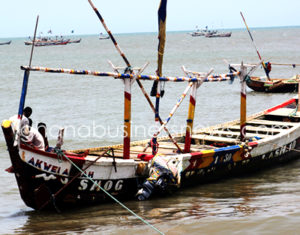Redirect pre-mix fuel subsidy to sustain fisheries resource – Prof. Sumaila
 Professor Rashid Sumaila, a Director at the Fisheries Economics Research Unit of the University of British Colombia says the continuous pre-mix fuel subsidy by the government is fueling the depletion of fish stock.
Professor Rashid Sumaila, a Director at the Fisheries Economics Research Unit of the University of British Colombia says the continuous pre-mix fuel subsidy by the government is fueling the depletion of fish stock.
In his view, the fuel subsidy does not inure to the benefit of the small-scale fisher folks but rather the large-scale fishers, and that, the policy facilitated the depletion of the stock in the ocean.
Professor Sumaila, who was speaking at the National Fisheries Conference on Fisheries and Coastal management in Accra, on Monday, urged the government to redirect such funds to protect the ocean and ensure its sustainability.
It was jointly organised by USAID Sustainable Fisheries Management Project, the University of Cape Coast’s Fisheries and Coastal Management and Capacity Building Project and the Fisheries Commission, with funding from USAID.
Under the theme; “Fisheries and Coastal Governance in Contemporary times”, the three-day conference seeks to highlight achievements, opportunities, share lessons learnt and key challenges with the implementation of the project.
Professor Sumaila called on government to improve national fisheries management, make illegal fishing unprofitable and buy insurance by creating the marine reserve.
He said the provision of subsidy in different forms to the fisheries sector was not unique in Ghana but worldwide, and that, it was having a negative impact on the ocean.
“Do not empty the ocean and go to sleep. We are taking too much from nature without caring about its sustainability. It is a disturbing issue that we need to think about and take steps to ensure its sustainability because many livelihoods depend on it,” he said.
The ocean provides many services such as oxygen, regulate earth climate, cultural, transportation, energy and jobs, but we are disturbing it with overfishing, illegal fishing and pollution of all sorts.”
Mr Steven E. Hendrix, the Acting Mission Director, USAID/Ghana, said the fisheries sector plays a very important role in Ghana’s socio-economic development; accounting for 1.2 per cent of growth domestic product in 2017, and contributes significantly to national food security and nutrition.
He said fisheries and aquaculture were sectors in Ghana’s broader blue economy, which was made up of all economic activities that are dependent on the country’s ocean waters, rivers and lakes.
“We want to see the progress made in the sector under the government as a great example of Ghana ‘beyond aid’ and its long journey to self-reliance,” he said.
Source: GNA
